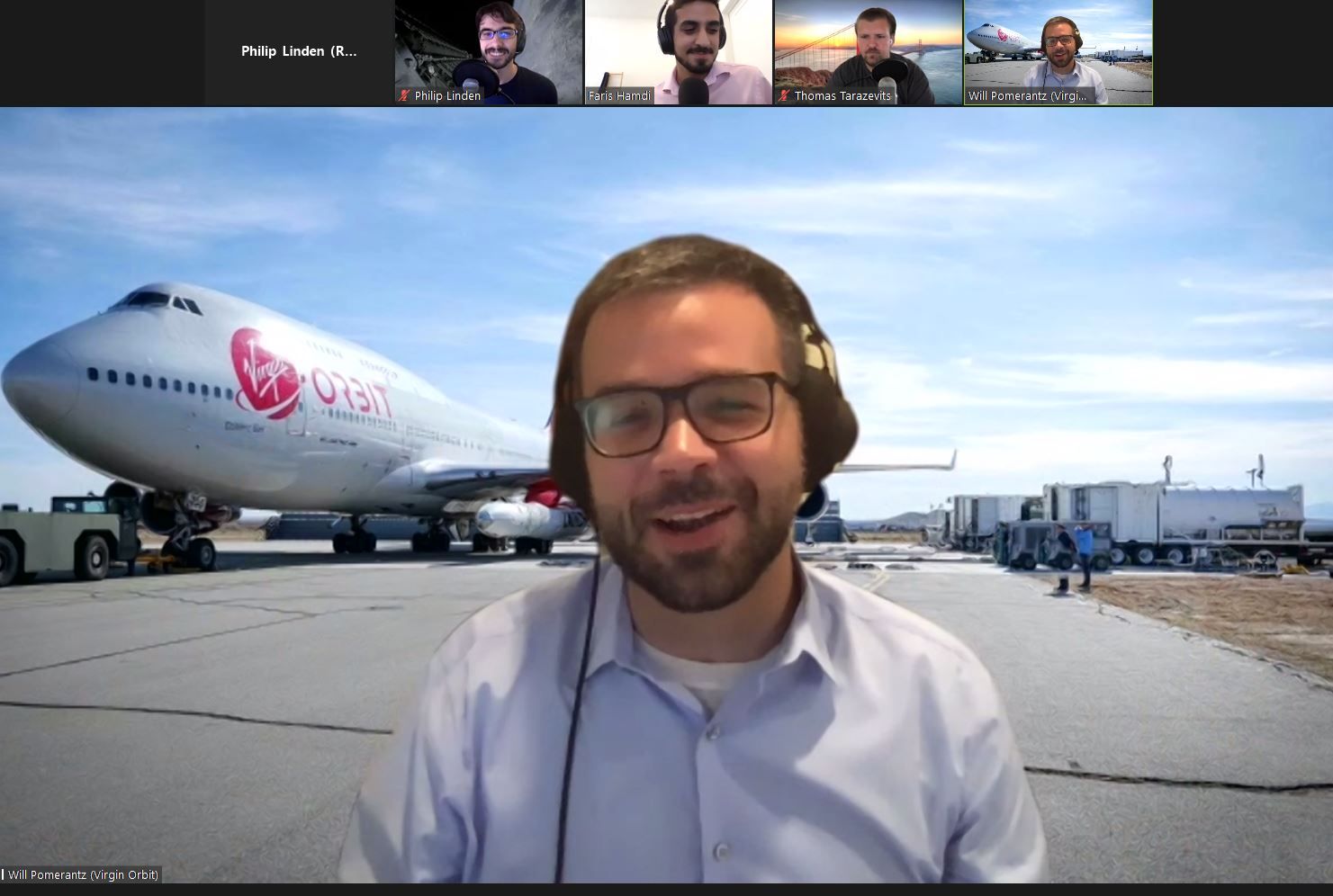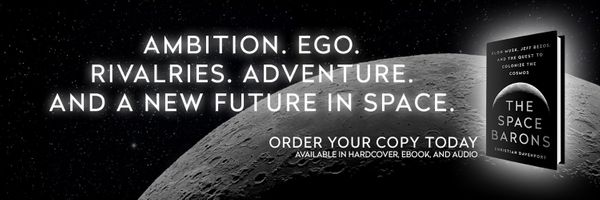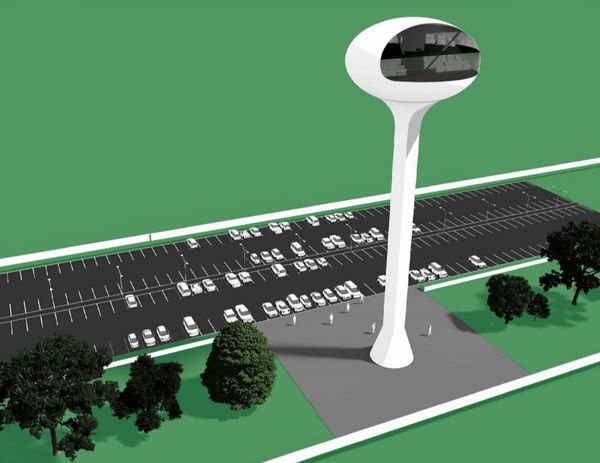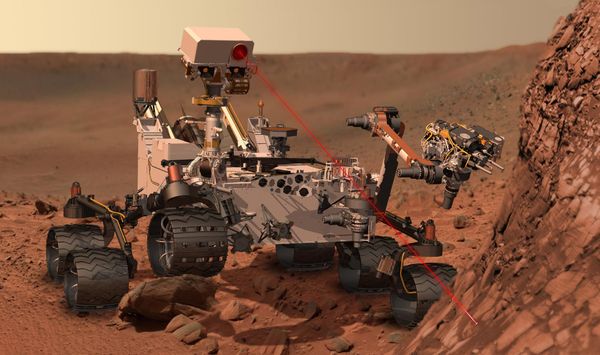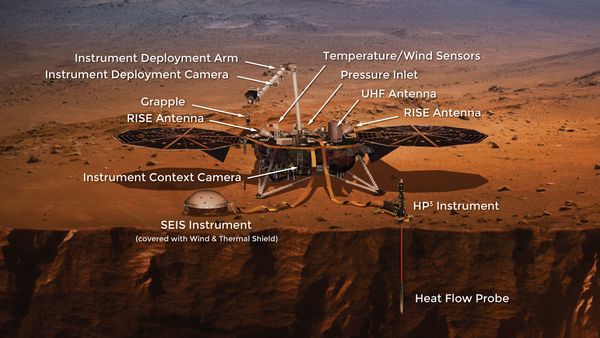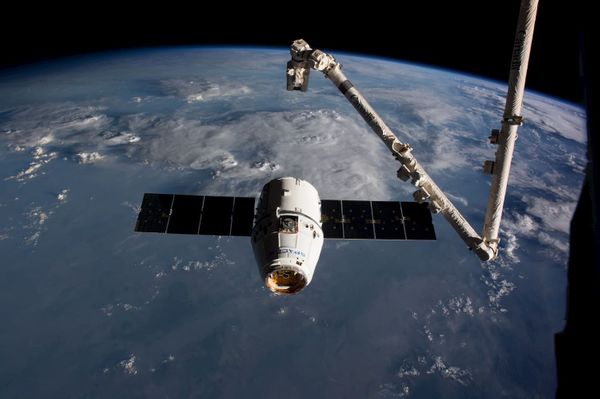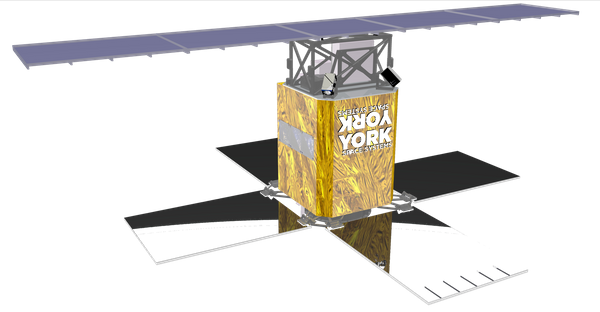Will Pomerantz is the Vice President of Special Projects & Brand at Virgin Orbit. Will has a rich background and experience in the space industry that spans from serving as Director of Space Prizes for the X Prize Foundation to being employee #1 at Virgin Orbit. In addition to his contributions to the technical side of the industry, Will chairs the Board of Advisors for the Students for the Exploration and Development of Space (SEDS) is a co-founder of the Brooke Owens Fellowship, which matches top talent among women engineers with the biggest names in aerospace.
Will joined us via Zoom on July 9 to talk about the origins of Virgin Orbit, mentorship, and diversity in today's aerospace industry. For the full interview, listen to the episode on Spotify.
SPEXcast: Hi Will, and welcome to SPEXcast. Tell us a bit about yourself and how you got started in space.
Will Pomerantz: Well, I'd say I am both a space fan and a space professional. I've been in love this this industry from the moment I started in it as an undergraduate student when I joined an organization called SEDS, the Students for the Exploration and Development of Space, and that opened my eyes to what the space industry actually is. It took it from being a neat but two-dimensional poster on the wall, you know, things that were cool to look at fun to think about but I didn't think about them very deeply, into something that's been a abiding passion for my entire career. As I realized the depth of how thoroughly and beneficially space impacts the lives of all seven billion people around the planet, and also as I realized the diversity of the jobs that exist within the space industry— it's not just astronaut and mission controller, there's lots of other fields as well— that inspired me. And then the lack of diversity of people filling those jobs, that pissed me off. And so I tried to dedicate my career to both increase the good things and decrease the sucky things about the aerospace industry though my day job at Virgin Orbit and through my past jobs at Virgin Galactic and the X Prize Foundation— doing things there trying to make the cost of space much lower which in turn will drive the frequency and accessibility way up— and then through a lot of the projects I do outside of my day job— whether that's SEDS or the Brooke Owens Fellowship or whatever else— trying to really help the industry both do a better job of identifying the talented people of diverse backgrounds that have always wanted to work in the industry, and then actually getting them in the industry and keeping them here by helping train them, helping recognize them, promote them, and do all the other things that we've historically done a great job for some parts of society but not as much for others.
Your title is VP of Special Projects. That’s pretty broad! What do you do day-to-day?
Yeah, I love my title! It is so broad as to be totally meaningless, which let's me do a lot of cool things and allows me to change up what I do, not necessarily day-to-day but definitely month to month and certainly year-to-year. I've gotten to do a lot of different things. I joined the Virgin Group at what is now my sister company, Virgin Galactic, about nine years ago with the same title. I took on that title because I was joining an early wave of employees, I was employee number 40 or something like that— still a pretty small company that was growing quickly. Even though it had been around on paper and as a small but awesome sales and marketing company for a long time, it was starting to staff up as an aerospace company with a presence here in the United States. It was in that phase that all early startups go through: every day you're turning over a new rock and you're either going to find a terrible threat or a wonderful opportunity that you had no idea existed last night. You don't need to master it, but you need to have a pretty good handle on what the heck it is and whether it is important within a matter of hours or a couple of days, when either your investors call to check in or when your window to respond to a procurement or hiring comes up... life moves very quickly. George Whitesides, my friend and mentor and boss there, was looking for someone to come in and be a jack-of-all-trades— even if that came at the expense of being a master of none— and to be unafraid of being thrown at a different problem every week of the month. That's what I got to do there. I got to do everything from program management (although that's not my strongest suit) to sales, outreach, media relations, investor relations, setting internal culture, technical requirements... lots of different things and helping out wherever it was needed.
In between fighting fires, my other job was to help Virgin figure out other things that it could do in space. Virgin already had a fantastic team at Virgin Galactic and The Spaceship Company working on— what I still believe is an important and beautiful project— of making a commercial space line to allow all kinds of people to personally fly in space. We knew that in the pursuit of that we were going to hire a lot of people that were smarter than I am, and we were going to staff up facilities, build manufacturing facilities, develop hardware and software, intellectual property... Any time you're going to pool together that much talent and that many facilities and, frankly, spend that much money on it, you should have more than one product for more than one audience. [...] So we asked, "What else can we do with the same skill set?" There was a big list of ideas for other things we might do. I got asked to go through that list, which was essentially bullet points on a napkin, with some academic rigor and determine which ones we should do now versus later, what should we do in-house... Some of those things were honestly pretty easy, like how to take the exact same vehicle for space tourism and use it for space research. [...] Other ideas were much bigger and harder, more expensive, and might be terrible or genius.
One of those ideas was this concept that perhaps Virgin should get involved in the business of small satellite launch. I was asked to work with smart colleagues to study the questions of "Can we do that?" and "Should we do that?" [...] both in the sense of whether we can make any money and whether it would our industry and our world any better. Going into the study I was pretty sure the answer was "Yes, I think we could do it," and I was equally sure the answer was "No, we shouldn't." I was familiar with the economics of launch vehicles (and those aren't necessarily the greatest set of economics in the world). And if launch vehicles in general had iffy financial prospects... we were talking about building a launch vehicle specifically for small satellites, and nobody was building small satellites at the time. And the few exceptions to that rule didn't have any money. So building a new entrant in an industry that typically hadn't made a lot of money for a customer base that didn't have any money didn't seem like a great combination. [...]
With the help of my very bright colleagues, we confirmed that this was a possible thing to do. And the surprising result to me was how thoroughly I became convinced that we absolutely should [do it]. That happened because I was able to connect with this incredible and quickly growing community of innovators who were building small satellites. I discovered not only how much the miniaturization of technology had positively benefited the manufacturing of satellites, but how that was coupled with other trends we were seeing. Because satellites were becoming so much smaller and could be built from lower cost components, that brought the price way down. Since the price came way down, now investors and customers that[had previously been priced out were now coming in. Included in that were students building satellites as students. And so we saw a huge influx of talent, particularly of young and early career talent, that flooded into small sats with all the enthusiasm and naivete and energy that youth implies, and the totally orthogonal ideas about what you could do and how you could do it compared to the traditional satellite industry.
And so I saw this hugely exciting pool of folks who were clamoring to use small satellites, and I saw that the thing that was holding them back was launch. Critically, it was holding them back in a special way. [...] They could take their first satellite or first couple of satellites and do what's called "piggy-backing" or "hitchhiking." That's a great way to get to space cheaply, sometimes even for free, but it's not convenient. That meant that there was enough launch capacity out there to allow for some "Darwinian evolution" of these small satellite entities and allow for real world results to show which ideas were good or bad ideas. But it required a new and different kind of provider in order for small satellites to actually fulfill their potential, both economically and scientifically and socially... So that's a good place for us to come in, to have a pre-vetted customer community to an extent, and to enable those customers to achieve their goals in the world and make an economic impact or peace-keeping impact or scientific impact... And we said "They need us, and no one else is doing it so by God let's go and do it." I was able to work with George Whitesides, Sir Richard Branson, and the awesome team at the Virgin Group to bring in a little bit of money and a lot of talent to set up a company now called Virgin Orbit that was dedicated to do exactly that. I technically count as employee number one at Virgin Orbit, which still seems weird to me all these years later.
Over the years, I've done everything from those initial feasibility studies and helping with early investor relations, recruiting our chief engineer, leading some technical programs... Yeah, running the brand and doing the Twitter feed in the early days... And you know, whatever else the team needed to remove distractions from the smart folks on the shop floor and to get customers and future employees and everyone else excited about this stuff.
[Listen to this episode on Spotify to hear more from Will about how the industry has changed for small satellite launch providers and Virgin Orbit over the last decade.]
Another aspect of your career has been your involvement in mentorship for young engineers coming into the space industry, such as serving as Chair of the Board of Advisors for SEDS and creating the Brooke Owens Fellowship. What motivates you to invest so much of your time into mentoring students?
It comes from my own personal experience. When I was an undergraduate student I joined SEDS. I can trace my entire career back to going to my first SEDS meeting. [...] It's how I heard about the graduate school I went to, it's how I heard about the major internships I got, it's how I met future bosses and mentors... As I got a little older and entered the industry, it became clear to me how these really tiny nudges and tiny opportunities in the life of a student have these massive outside changes. As an alum who stayed involved with SEDS, I could literally have a five minute call with a student— and it's not like I'm some great genius or anything, I just know the names of people and their email addresses, and, you know, I've been exposed to concepts that they haven't been exposed to. If I can do something as simple as suggesting the name of a book to check out of the library, or a website to read, or a podcast to listen to... that could totally change a career. And it costs me nothing— it costs me literally no money and almost no time. So why not do that? Why not do that a lot? It's just some tiny adjustments here and there. And sure enough, I met a junior in undergrad, they said, "Can I buy you a coffee?" I said, "I don't drink coffee but let's talk for fifteen minutes." Then I hear from them 10 years later and they've started a startup and ask me to be on their board of advisors... That kind of thing is really gratifying, so I always love giving back.
It's not only service— it's fun for me. I like speaking to young people or going to SEDS Space Vision Conference. Y'all's vision is great. When you've been in the industry for a while, it loses some of its magic because you see it every day. It's nice to see it through the eyes of someone who hasn't had that happen to them yet. Like if they're excited to hear an astronaut talk. Sometimes I'm like, "Oh my goodness, another astronaut talk?" No! Astronauts are awesome! I had forgotten that because I've been so spoiled. So that's been wonderful and really drove my involvement in SEDS.
Another big opportunity for me has been a project that I co-founded a couple years ago called the Brooke Owens Fellowship.
How did the Brooke Owens Fellowship come to be?
This is something I helped start up along with two remarkable women: Lori Garver, who was the Deputy Administrator at NASA for many years, and Cassie Lee, who at the time was running all of space for Paul Allen and now is a senior exec at Lockheed Martin. The three of us actually weren't all that close with each other, but we all had a friend in common named Brooke Owens. When Brooke passed away at a tragically young age, just a few weeks shy of her 36th birthday, we were all in grief and in shock even though she had been sick for a long time. It was Lori who sent an email to a lot of people in the aerospace industry saying, "I can't believe Brooke's gone. I need to do something in her honor and I've got a couple ideas. Who wants in?" Almost everyone wrote back and said, "That sounds wonderful. Please let me know what you'd like to do and I'll support it." Cassie and I were some of the ones who wrote back and said, "Yeah, I want to help. I've got ideas and I want to improve your ideas. Let's get together."
So we found that we had common interest that aligned with Brooke's interests, and one of those was getting more women into the aerospace industry. The gender numbers in aerospace are still pathetic. It's something like 14-20% of the industry are women, when every reasonable statistic suggests that should be about 50%. That's way way way under. Early in my career I had made the foolish and naive assumption that this was a time problem. "Oh, that's a problem that started n the sixties and there aren't enough role models, it just takes a while... If we just wait the problem will fix itself." And as I actually looked at the data and started paying attention, I realized that is not what is happening here. I categorically reject this bizarre and offensive philosophy that women just aren't interested in space. That's total bullshit. I've seen so many data points that say that is clearly false.
What is happening is that we are not creating a workplace or an academic place that is welcoming to [people of under-represented genders]. We are pushing them out, we are undervaluing their talents, we are not recognizing how to select them as candidates...when they come into the industry we are not rewarding them in the same way, we are not promoting them the same, not training them the same— we are not doing anything in the same way and that is ridiculous. Shame on us. It's a huge loss, not only for those individuals but for our community. This is a business that is really hard; we need a lot of brainpower. If we're excluding half of the brainpower, we just got 50% dumber because of our own decision to do that.
So the three of us teamed up to create this program— we made it up on the fly. In all honesty, we invented most of the program over a period of 24 to 48 hours so we could have it ready in time for Brooke's memorial service so we could talk to her family about it and make sure they were on board with it. Because of the talent, experience, and creativity of my co-founders, a bunch of superstar mentors and volunteers, and now the students themselves— we built this incredible family and program, won a bunch of awards and recognition, but to me the best metric of success is an internship and mentorship program where we find women and people of all under-represented genders, trans and non-binary people as well... we have a unique and bias-free way to identify talent that may have been overlooked elsewhere.
Through a very competitive process, we hook them up with meaningful and paid jobs at leading aerospace companies and nonprofits in the United States. We get them a living wage, an awesome and challenging job, a good boss, a good project to work on, an executive level mentor... and then we bring them all together for a summit, and a couple other things. What we're finding now is that we now have these women who have gone through our program who before our program they applied to every job in the industry and not even getting interviewed, and now they are beating off job offers that are coming in all the time. Every company wants to employ them, they're going on to win awards, leading big projects, getting scholarships to the best graduate schools in the country... that's not because of us, that's because of them. The talent was always there, it just required someone to look for it in the right way and enable it in the right way. It's been an incredibly fulfilling project to work on.
What advice would you give to other professionals in the space industry about how to get started in mentoring?
My main advice is to just do it. It's pretty easy to find a student who wants to be mentored— they all want to be mentored. I can guarantee that whatever your capacity is, where ever you live geographically, whatever part of your career you're in, there is some kid out there who would love to buy you a coffee and pick your brain and talk to you every once in a while. Usually it doesn't take anything more than looking up the website for your local community college or university... find your local SEDS chapter, AIAA chapter, SWE chapter, National Society of Black Engineers chapter— whatever is a particular flavor of student you think you can help the most, enjoy working with the most... they're not that hard to find. Go to the annual Space Vision Conference (or virtually attend). You'll find an audience of incredible students there who will be enthusiastic and passionate who will ask you really easy questions and really hard questions, which are both fun to deal with.
Be a little generous with your time. No matter how busy you are, everybody can make 15 minutes. If people who run governments and companies and hospitals and whatever else can do it, you can do it to. Find a little bite here and there.
Lastly, share your mistakes as well as your successes. Don't let people repeat your failures. If my own career is any history, I think most for people we view our failures in a totally new context when you have a decade or so of perspective. Young people live in the moment, which is a wonderful strength but sometimes a drawback because they can get so set back by one small failure or a bad grade... We as folks with more experience have the opportunity, and I would say also the duty, to go and say, "Hey, get back up and try again. I got C's, it happened. Nobody cares anymore. Nobody asks about my GPA, ever. It'll happen to you someday as well. So get back up and try again."
Listen to the whole episode on Spotify to hear more from Will about mentoring and the Brooke Owens Fellowship.
Get involved!
Below you'll find links to a number of organizations working to make the aerospace industry and the world better for all.
- SPEXcast Donation Matching Program. The SPEXcast team is matching donations to Campaign Zero and Black Girls Code up to a total of $300.
- Students for the Exploration and Development of Space (SEDS). Find your local SEDS chapter to join as a student member or a mentor.
- Brooke Owens Fellowship. Discovering and enabling the best talent in aerospace by supporting young professionals of under-represented genders.

